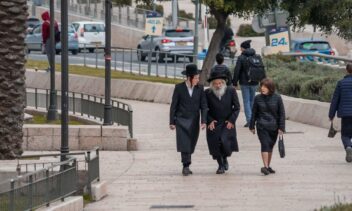You can download a complete PDF of all three articles in this Pesach Reader here.
On one auspicious night in ancient Egypt, our ancestors’ homes were passed over. The doors to their homes were marked with blood on the lintel, and they survived the onslaught of death that took the first born children of the Egyptians. To mark that night, and the coming redemptions and salvation that came our way, we celebrate Passover.
We know this all too well, but there is one aspect that goes little discussed: Why the door? Why not the chimneys, or the roof, or the windows? R. Yehudah Aryeh Leib Alter, the Sfas Emes of Gur, notes that a doorpost is a liminal space, a near-definitional in-between zone, a place in which things transpire or pass. In a sense, the first night of Passover was the beginning of a climax of a narrative arc, in which the Jews are saved from persecution. The Sfas Emes tells us that the salvation had to occur through a doorpost to indicate that all this was only the doorstep to a far greater story.
A mystical tradition reads (or perhaps says) the word Pesach as פה – סח (peh-sach), which translates to “mouth speaks.” In Egypt, or Mitzrayim, which can be read as alluding to the Hebrew word for constraint, the Word was in exile, and upon redemption the Word was redeemed, too. Used countless ways by countless thinkers, in its simplest form, this wordplay communicates that the very act of communication, of learning how to put thoughts and feelings into words, can be the beginning of freedom, liberation, and independence. Language then is a way of opening a door, or it benefits from the door being opened, or perhaps it is the door.
There are many doors to Pesach. Family is one door, history another, and one’s personal life another. The many questions of the Seder night are tiny little doors (think Charlie and the Chocolate Factory, and consider why the word for the fourth letter and the word for door are the same— דלת). We offer two doors of our own, doors that took much to prop open. The first, by Dovid, is about the door that one lonely Pesach opened. The second, by myself, is about the door that crumbled, fragile matzoh might open, even if it breaks down. In doing so, we invite you to find your own door, and to do what you can to enter. As Todd Boss tells us, “It is Enough to Enter.” Dayenu.
It Is Enough to Enter
Todd Boss
the templar
halls of museums, for
example, or
the chambers of churches,
and admire
no more than the beauty
there, or
remember the graveness
of stone, or
whatever. You don’t
have to do any
better. You don’t have to
understand
the liturgy or know history
to feel holy
in a gallery or presbytery.
It is enough
to have come just so far.
You need
not be opened any more
than does
a door, standing ajar.
—
“Spending the Seder Alone”
Dovid Bashevkin, Tablet Magazine
“This night was different from all other nights,” he writes, “because I was finally asking different questions.”
This Pesach, Find Your Door. Then Open It. This Pesach, Find Your Door. Then Open It.
“I Believe in Broken Matzo”
Yehuda Fogel, Tablet Magazine
Here, he explores “what shards of unleavened bread can teach us about the nature of faith.”








